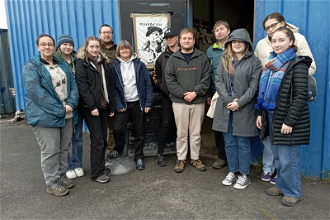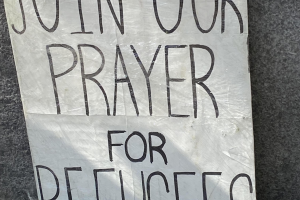Columban competition on Migrants - Joint Third Place (1)

Hilda Kagaba, 16, from St Pauls Catholic Secondary School, Milton Keynes won joint third place for her submission in the Columban writing competition. Her essay is entitled: 'Migrants are our neighbours' a personal piece.
Migrants are our neighbours, but they are also our nation.
I, being a first-generation Ugandan immigrant, by default, can share in the experience of many of these migrants we consider our neighbours. With heightened situations that have left thousands seeking homes, millions feeling unwanted, Brexit was political representation on the social and somewhat generational divide, with the most publically popular premise for people wanting to leave Europe being Migration.
But though born and raised here, and considerably British I have encountered situations where I too feel more like a stranger than a neighbour. Brighton 2015, a group of lads shouted out a derogatory term that not even I, though allowed to use, do not. Some of us laughed, some of us were confused, some of us 'didn't hear it ' and carried on. Why? Not knowing something is often more comfortable than knowing it. Up until then any form prejudice in my life had been non-existent, and even then I questioned it, as if it were now real.
Migration seems to be a point of conflict between non migrants and migrants. Some 'native' British people are seemingly opposed to migration more commonly claiming, "they are stealing our jobs", which is true. The UN department of economic and social affairs says, "International migration for work remains the most common reason for migration to the UK". However many migrants to Britain have kids, legally-working spouses and want nothing more than to settle down, pay their taxes and grow old comfortably like everyone else. And yet, the government is stopping them.
The reason Britain went from being a deteriorating colonial power to a global superpower is simple - migration. The latest statistics shows that in June 2017, net migration to the UK was 230,000. The national multicultural transition has led to us all being accustomed to things which were once foreign: where for some a curry resonates more with the idea of being British than bangers and mash. We are bombarded with technology, food, clothes, media because of these migrants. And we ought to be grateful. I don't know about you, but I couldn't survive without a kebab on a Friday night.
Attending a Catholic school, the idea of "love thy neighbour " is heavily embedded into the school, and the value of accepting everyone. Through implementing basic Catholic Social Teaching about "the right to life and the conditions worthy of life - when threatened" the school creates an environment where everyone is integrated and regarded as neighbours, with a variety of people: Muslims, Blacks, Hindus, Asians, Russians. Despite international ethnic tension these seemingly major issues are surpassed by more futile ones, like who stole Smith's girl.
A recent experience where I was educated on the economic benefits of migrants and how these masses of people were in fact here was because at one time we needed them. The teacher proclaimed, "I'm not being funny but look around the room". We all looked, awkwardly looked, and laughed. For he though seemingly non migrant, was too an immigrant by default. There are now an estimated 258 million people living in a country other than their country of birth. 90% of the class fell into the category of being generational migrants or immigrants, whether it be from Africa, Europe, South America. Physical borders that aim to prevent these alliances, like Trump's infamous 'wall', exhibit a place where I wouldn't want to live. The opportunity to communicate with these people should be valued because even though we are doing them a 'favour', we need them; we need migrants as our neighbours, or would you prefer them as our rivals?
Whilst interviewing a friend, who will remain anonymous , when asked about the question she said, "I mean, I don't see the problem with it; as long as they are good people, who are here for a reason, a good reason, I have no problem". Despite some naivety towards the larger scale of net migration, the simplicity in their view is one many more should encompass and one politicians envy.
My parents lives were tough when they got here, no question - new and exciting yet unknowingly scary and stressful, but they were not sent back to Africa. The UK received 38,500 asylum applications in 2016. This was less than Germany (587,346), Sweden (83,103), and France (62,771). And this is an issue: In 2015, just 45 per cent of cases were granted asylum. Many are initially refused because it is difficult to provide the evidence needed to meet the strict criteria of a refugee. We as a country cannot sit comfortably until we truly understand the desperation and fear for life some of these people encounter .We have grown accustomed to an unsympathetic state.
Regardless of our current position there will come a time when we are in need of that helping hand that we were reluctant to offer, where ultimately it in turn will foreshadow what we receive, in our time of need.
But let's be honest: Who among us has the right to deprive another from security, shelter, a home? Home is wherever you want it to be and migrants should be allowed to have one here. I see both sides of the spectrum, though I myself cannot be kicked out. I understand the hostility. But when they are told to go back to their war torn stricken countries, countries with no promise for a future, we must think about their plight and include migrants. As a human, exclusion troubles me. And it should trouble everyone.
Migrants are our neighbours."I wanted to work , I wanted a chance, I wanted a happier life , I got one"-Anon





















